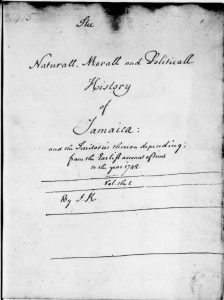I’m happy to let you know that the Library now has access to Slavery: supporters and abolitionists, 1675-1865 from British Online Archives. This database contains a wide range of documents concerning the African slave trade during the 17th, 18th and 19th centuries. The papers focus primarily on Jamaica and the West Indies but also cover the experience of other nations and regions.

You can access Slavery: supporters and abolitionists, 1675-1865 via the Databases A-Z list and the Digital primary source and archive collections guide.You can also access it via DiscoverEd.
Through a combination of statistics, correspondence, pamphlets, and memoirs, Slavery: supporters and abolitionists offer insights into the commercial and colonial dimensions of slavery and the views of its advocates and opponents.

Screenshot from James Knight, vols 1-2, draft A, 1742.
The database contains over 28,000 digitised pages from 5 volumes:
-
Correspondence from Planters and Traders, 1694-1776
This correspondence is derived from two different sources. The documents from Lascelles and Maxwell are focussed upon trade and cover slavery where it plays a part in the business. The Samuel Martin papers focus on Antigua as they are derived from a planter who was based in Antigua; unlike the Lascelles and Maxwell content, their focus is personal. This combination of correspondence yields both a personal and a business perspective with regard to the role of plantations. -
Official Reports on the Conclusion of the Slave Trade in Africa, 1811-1865
These reports incorporate the content from three different collections: ‘Report of the Commissioners on African Settlements: report on the slave trade’, 1811; the ‘Report of the Select Committee on the West Coast of Africa’, 1842; and the ‘Ord report on the West Coast of Africa’, 1865. They commence with an assessment of the impact of the slave trade and the necessity of ending it. They then cover the aftermath of some slaves being released, before concluding with the financial impact of having released the slaves. -
Anti-Slavery Papers, 1833-1892
The contents of these papers share certain core themes. They reveal abolitionists’ concerns over some churches’ reluctance to either denounce slavery or refuse to accept the proceeds of the slave trade. The American Anti-Slavery societies had mixed views on their British counterparts’ protestations as post-revolution tensions remained and attacks on slavery were sometimes viewed as attacks upon the American states’ fledgling Independence. These papers also include anti-slavery tracts, minute books and correspondence. -
Records from the Slavery Business, 1692-1849
Those who derived profit from slavery kept detailed records of how their businesses progressed. These records reveal the roles played by five different businesses that derived profits from slavery through plantation ownership and the transportation of slaves. The plantation records form the bulk of this grouping, the notable exception to this pattern is the ‘Log and journal of the Bristol ship, Black Prince, 1762-1764’, these detailed records reveal both where slaves were boarded and details of slave trading which took place on-board the ship. -
Jamaican History, 1658-1792
This grouping is composed of the ‘materials on the history of Jamaica in the Edward Long papers, 1734-1813’. Containing a range of memoirs and histories on Jamaica, with some coverage of the West Indies also included. The Long papers provide personal details of life on slaving colonies through a range of narrative accounts. In addition, they also include some of the research and notes which the authors used to compose their memoirs.
You can access Slavery: supporters and abolitionists, 1675-1865 via the Databases A-Z list and the Digital primary source and archive collections guide. You can also access it via DiscoverEd.
The Library has access to a large number of digitised primary source and archive databases, you can find these on the Digital primary source and archive collections guide.
Access is only available to current students and staff at the University of Edinburgh.
Caroline Stirling – Academic Support Librarian for History, Classics and Archaeology

Pingback: On trial: digital collections relating to the slave trade and slavery in the West Indies | HCA Librarian